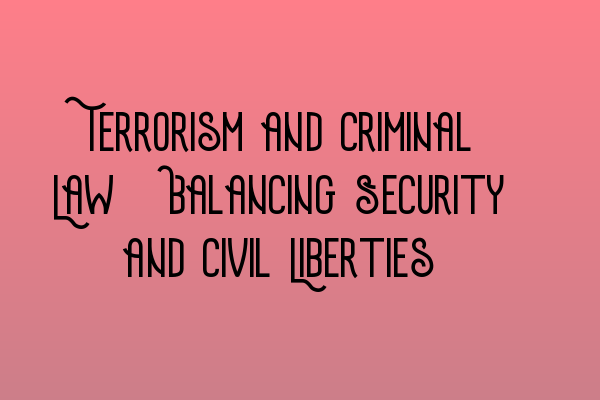Title: Terrorism and Criminal Law: Balancing Security and Civil Liberties
Introduction
In today’s ever-evolving world, the battle against terrorism has become an integral part of criminal law practices worldwide. Governments strive to strike a delicate balance between ensuring national security and upholding civil liberties. This blog post explores the blurry landscape where the fight against terrorism intersects with the principles and complexities of criminal law. We delve into the mechanisms employed to safeguard society while preserving the individual rights that form the foundation of a democratic society.
Understanding Terrorism and Its Threats
Terrorism, by its very nature, poses a pervasive threat to the safety and security of nations, communities, and individuals worldwide. It is characterized by acts of violence, intimidation, and fear, often orchestrated by extremist groups seeking political, religious, or ideological goals.
Keywords: terrorism, threat, safety, security, acts of violence, intimidation, fear, extremist groups, political, religious, ideological.
National Security Imperatives
Maintaining national security is a top priority for governments globally. In combating terrorism, legal systems strike a balance between intelligence gathering, preemptive measures, and reactive prosecution. Understanding the importance of protecting citizens from potential harm, governments enact laws that empower law enforcement agencies to prevent, detect, and neutralize terrorist threats.
Keywords: national security, combat terrorism, intelligence gathering, preemptive measures, reactive prosecution, protect citizens, law enforcement agencies, terrorist threats.
Preserving Civil Liberties
While safeguarding national security is crucial, it must be done without compromising the fundamental rights and liberties of individuals. Upholding civil liberties, such as the right to privacy, freedom of speech, and a fair trial, is paramount to ensure democratic values remain intact.
Keywords: civil liberties, privacy, freedom of speech, fair trial, democratic values.
The Balancing Act: Counterterrorism Legislation
To address the complex challenges posed by terrorism, governments enact counterterrorism legislation that allows law enforcement agencies to take preventative action, investigate potential threats, and prosecute individuals involved in terrorist activities. These laws aim to strike a balance between security imperatives and protecting civil liberties.
Keywords: counterterrorism legislation, preventative action, investigate potential threats, prosecute individuals, strike a balance, security imperatives, protect civil liberties.
Challenges and Ethical Considerations
The fight against terrorism is not without its challenges and ethical considerations. Striking the right balance requires careful deliberation, respecting the rule of law, and maintaining the integrity of legal systems. Key challenges include distinguishing between genuine threats and false alarms, avoiding racial or religious profiling, and dealing with evidence obtained through surveillance practices.
Keywords: challenges, ethical considerations, strike the right balance, rule of law, integrity of legal systems, genuine threats, false alarms, racial profiling, religious profiling, evidence, surveillance practices.
International Collaboration
Terrorism is a global issue, and fighting it necessitates international collaboration and cooperation. Governments, law enforcement agencies, and legal experts work together to share information, intelligence, and best practices. International treaties and frameworks, such as the United Nations Security Council resolutions and the European Convention on Human Rights, provide a legal basis for collective action.
Keywords: international collaboration, cooperation, share information, intelligence, best practices, United Nations Security Council resolutions, European Convention on Human Rights, collective action.
Conclusion
The fight against terrorism presents a complex landscape where criminal law and national security intersect. Striking the right balance between security imperatives and civil liberties is a constant challenge. By enacting counterterrorism legislation, preserving civil liberties, and fostering international cooperation, societies can work towards a safer world while safeguarding individual rights. It is in this delicate balance that the best solutions can be found, ensuring security without sacrificing freedoms.
Keywords: fight against terrorism, criminal law, national security, balance, counterterrorism legislation, civil liberties, international cooperation, security, individual rights, freedoms.
Note: This blog post aims to provide general information and does not constitute legal advice. Each jurisdiction may have specific laws and regulations governing terrorism and criminal law.
